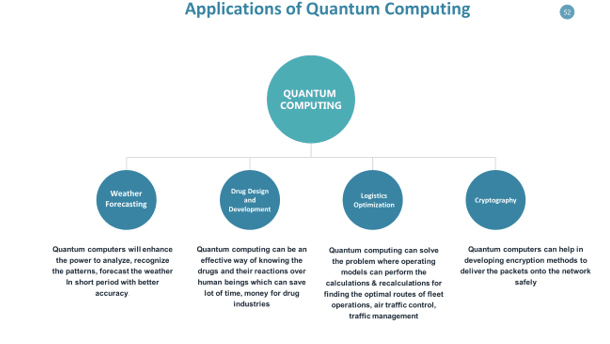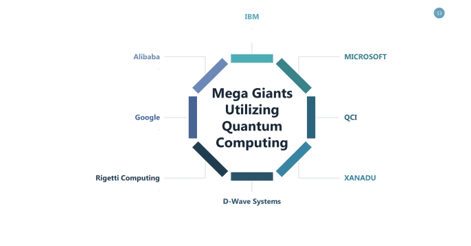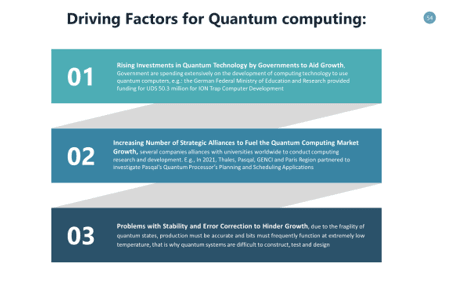Unleashing the Potential of Quantum Computing: Revolutionizing Industries and Solving Complex Problems
Do you know that April 14th is celebrated as World Quantum Day? Planck’s constant describes the behaviour of particles and waves on the atomic scale, including the particle aspect of light, on which quantum computing is based on.
Then what is Quantum Computing?
Quantum computing is an investigation into the development of computer-based technologies centred around the principles of quantum theory, an origin from physics. Quantum computing uses a combination of bits to perform particular computational tasks. As a consequence, we see the development of quantum computers, which are the machines that use the properties of quantum physics to store data and perform computations. This can be extremely advantageous for solving complex and massive operations speedily and efficiently. Whereas, classical computers, which include smartphones and laptops, encode information in binary “bits” that can either be 0s or 1s. In a quantum computer, the basic unit of memory is a quantum bit or qubit.
Applications of Quantum Computing:
Using the operations of quantum computing in several applications can help in the improvement of processes in many industries, save million-fold of time and provide a pathway to most complex problems. Some of the applications are listed below where quantum computing can play a significant role:
- Computational Chemistry: One of the most promising quantum computing applications will be in the field of computational chemistry. It is difficult for conventional computers to process tiniest and vast numbers of molecules, but quantum computing provides a strategical pathway to map the molecules, which in turn provides an opportunity for pharmaceutical research. Some of the critical problems that can be solved via quantum computing are in the area of in silico clinical trials
- Artificial Intelligence: Artificial intelligence is already an emerging technology in various fields, from e-commerce and healthcare to finance and education. But along with quantum computing, it will be a lot easier to make decisions
- Finance: Quantum computing can help in making more accurate simulations and predictions of market activity to ease out analysts’ functions, which classic computers fail to do
- Healthcare: The effectiveness of quantum computing in healthcare can enable many significant breakthroughs, such as quick DNA sequencing and the processing of large amounts of healthcare data.
Some of the other major applications are mentioned below:

The mega-giant companies bringing the technology of quantum computing to their businesses are:

- IBM: It became the first company in 2016 to offer cloud-based quantum computing access and now it plans to release a 433-qubit processor called Osprey and Condor, a 1,121-qubit processor that will succeed in 2023 with the hope of solving problems more efficiently
- QCI: The company believes in complementing classical computation with quantum computing and, with this vision, it unveiled a software-as-a-service (SaaS) called Qatalyst, a quantum computing platform
- Xanadu: A Canadian start-up offering a very first photonics-based quantum computing platform, available through the cloud where this system uses light instead of superconductors, letting them operate at room temperature
- Microsoft: Its azure cloud platform introduced quantum computers made by Honeywell and IonQ to tackle problems which are out of reach of conventional machines. BMW, Airbus and Roche are trying out quantum computers by Microsoft already
Market Insight:
According to Fortune Business Insights; the quantum computing market is expected to grow from $486.1 million in 2021 to $3,180.9 million in 2028 at a CAGR of 30.8% during the 2021-2028 period. Where the market value was USD 392.5 million in 2020. It is found the demand of quantum computing will increase with the emerging time as highly used by many computing services.

The Future of Quantum Computing:
As supercomputers are limited to solving linear problems and it gets difficult to find solutions to chaotic problems, wherein quantum computing leverages solutions for complex problems like protein modelling by using the physics of quantum mechanics. It can also try several solutions simultaneously. It can also support data processed by AI systems, which requires enormous computational power.
Conclusion:
As we now know, quantum computing adds value to many applications through its usage of qubits that can be both 1 and 0 simultaneously, but we cannot subside the drawbacks of quantum computing. One of the most challenging parts is its robust nature, it is immensely hard to engineer it. Also, the quantum CPU will have efficiency and heating problems of its own.
Hence, the characteristics that make quantum systems capable also make them delicate and cause the whole system to fall apart.
Author: Riya Singh
